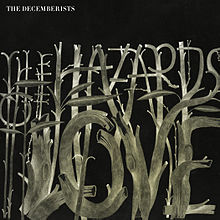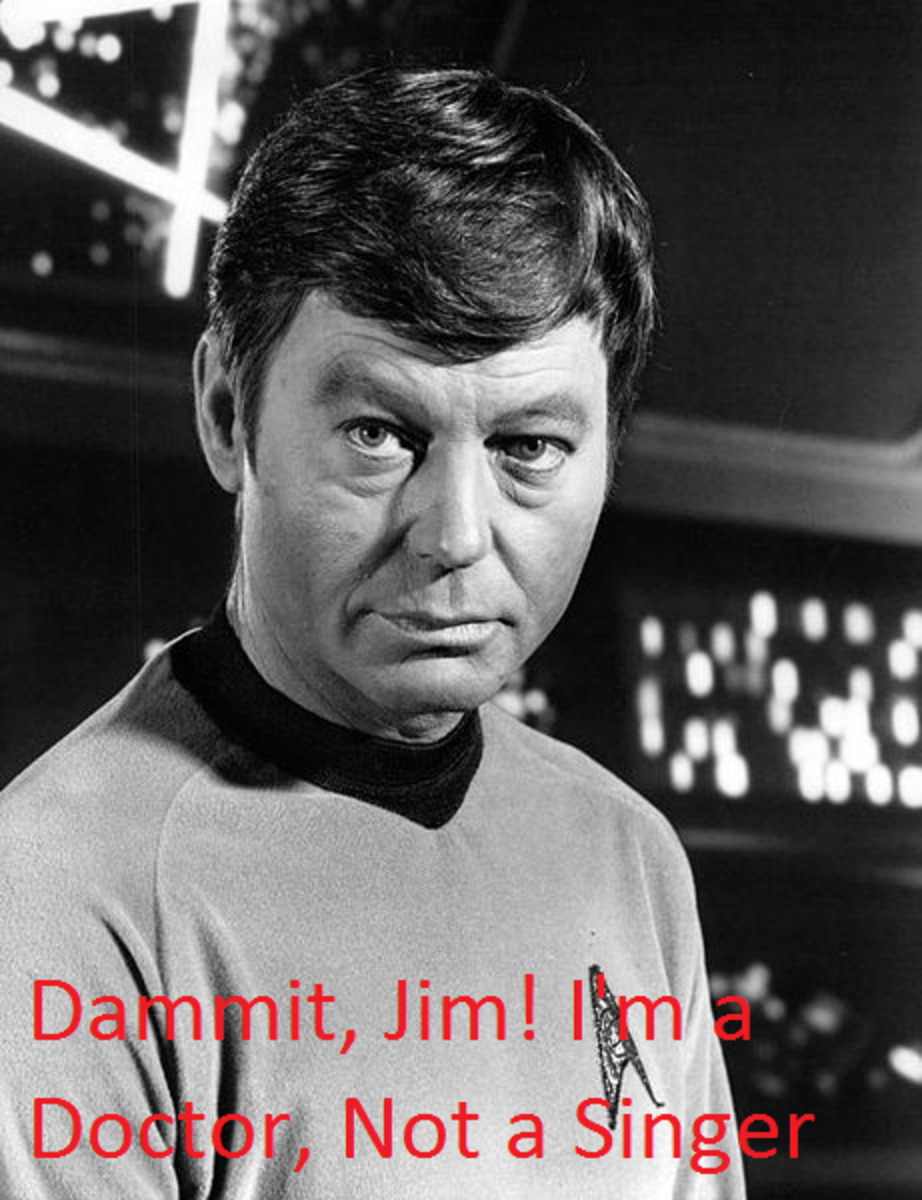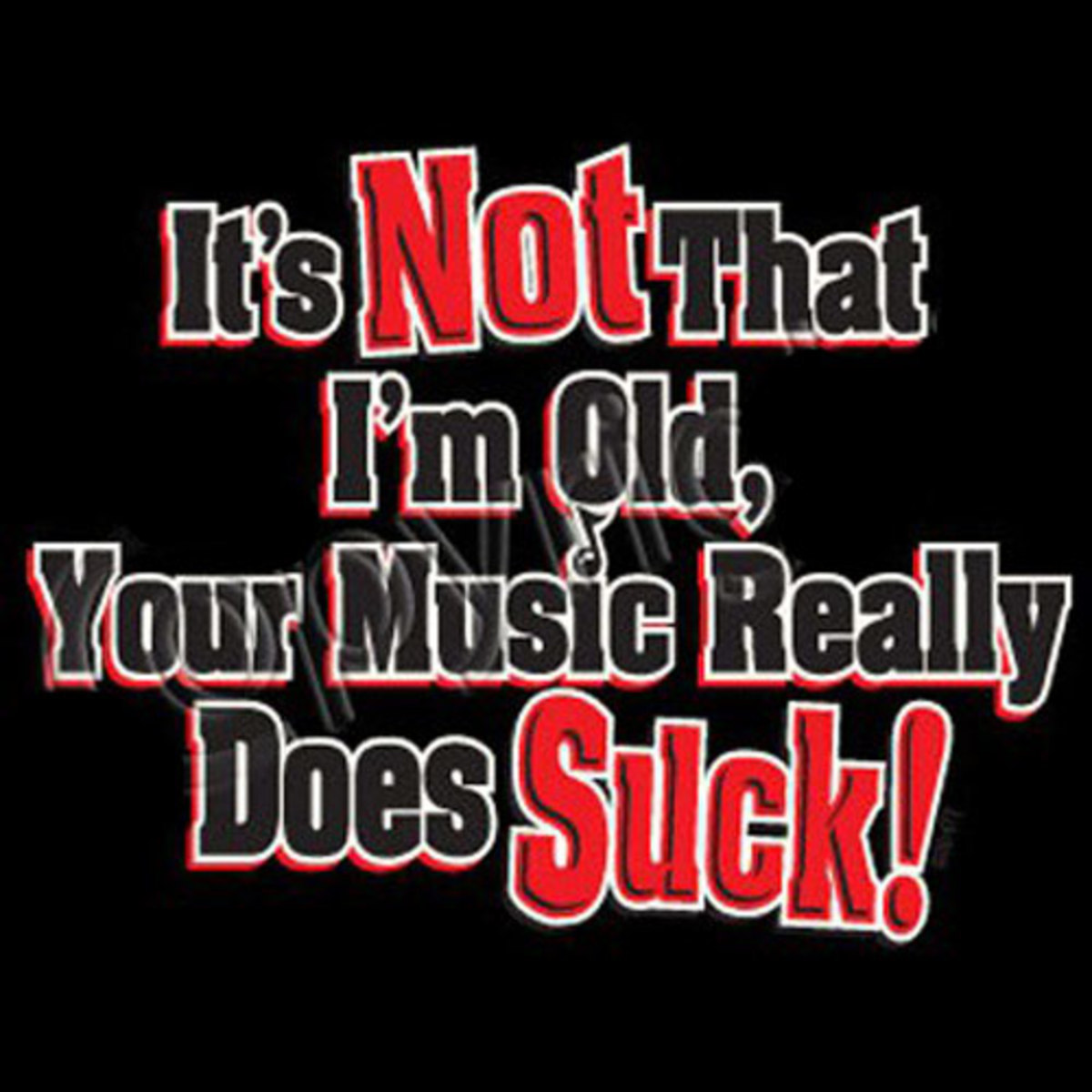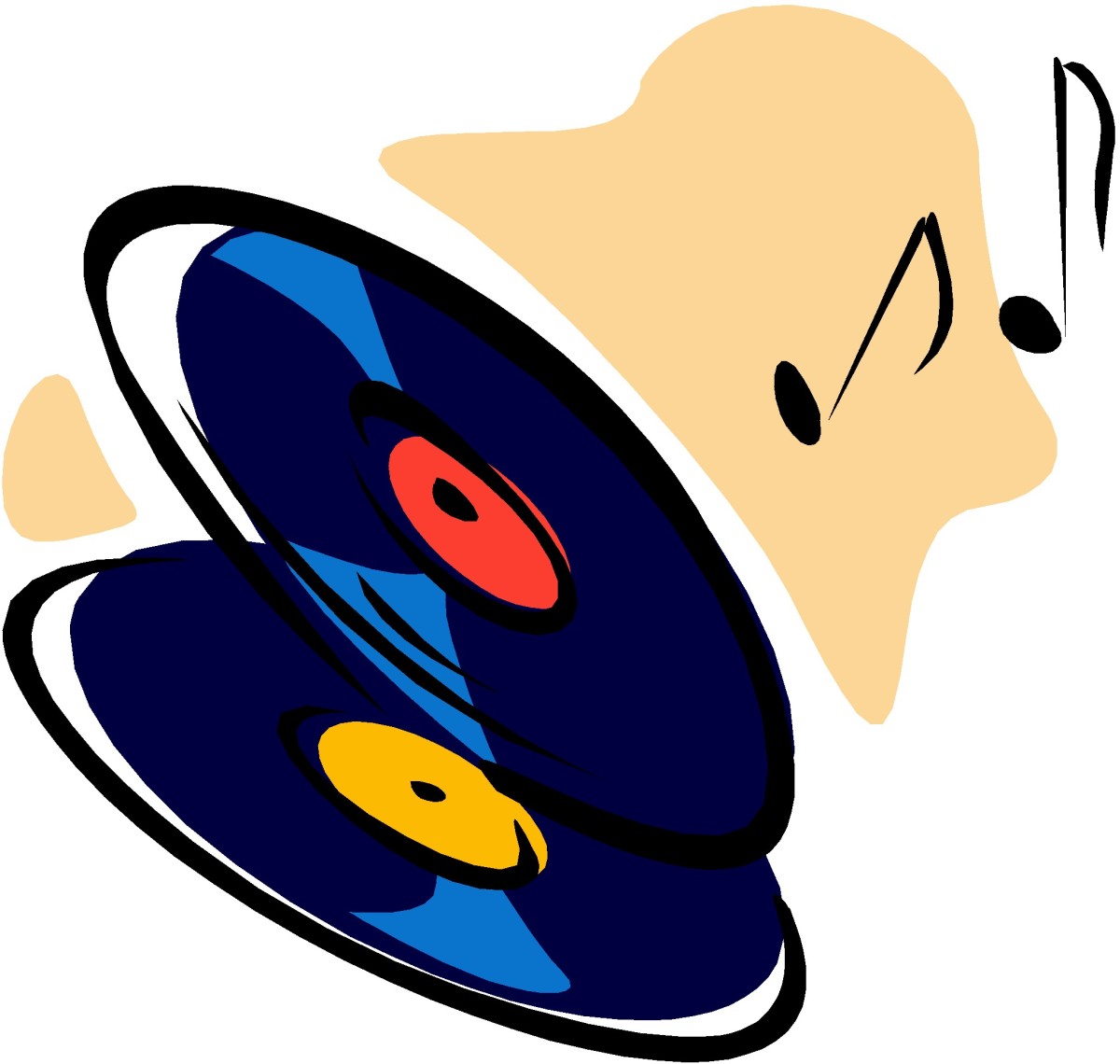Concept Album Corner - 'The Hazards of Love' by The Decemberists

Though the month of February has come and gone, romance still swims through the air, maybe not always in the real world, but certainly in the world of fiction and fantasy. I’ll be one of the first to state that I’m not a huge fan of romance stories. One would have to point me out to an incredibly skilled storyteller’s musing on the nature of love for me to even consider giving it my time, and even then I’d put it off to the side for more important goals like brushing my teeth or reading the news. While love can be expounded upon and talked about as deeply as any other passionate emotion, telling a story of love – in general terms, at least, to appease the tastes of the general public – doesn’t seem to have very much depth or variation to the theme, in my opinion: two people catch each other’s eye and spend time with each other and get to know one another very well, tragedy will strike, and they’ll make it through, perhaps even in death. There is nothing wrong nor shameful about indulging in romantic fantasies through the stories of another, but the major problem that comes out of romance stories is that the characters can be incredibly poorly formed. It’s like listening to that friend of yours ramble on and on about how happy they are in their relationship and how wonderful their partner is and so on and so forth. Sure, you’re happy for them and you hope they have a long-lasting bond, but it’s hard to empathize with them as you can’t experience the feelings that they do. Now imagine that you have no connection, friendly or otherwise, with this romantic braggart and you can see the number one problem with The Hazards of Love by The Decemberists.
Back in December, I had taken a look at The Decemberists and their concept album, Picaresque, an album comprised of separate tales of rogues and runaways, young lovers and angst-ridden teenagers, sifting through time and place. From that album alone, The Decemberists’ frontman and lyricist Colin Meloy certainly deserves a fair degree of recognition for his storytelling talents. He masters descriptive techniques along with his songs, his vocabulary expansive and rich with old European language and vernacular. However, as some might remember my review of Picaresque, some may remember that I did not find it to be a particularly captivating or memorable album save for the song ‘The Mariner’s Revenge Song’, which I still haven’t grown tired of. My reason for this is that, while The Decemberist’s are obviously quite skilled at playing music and Meloy is quite gifted with his words, there is no memorability to either of them because there seems to be a lack of passion in their work. Not that they don’t show a love for playing music and telling stories, they certainly display that pretty well. But, with few exceptions, The Decemberists have never really hit a strong emotional core with me because their music doesn’t hit as hard as it should in that area. With ‘The Mariner’s Revenge Song’, a short and adventurous tale of grisly retribution, they didn’t need to hit any deep emotions; it was a song that exhibited Meloy’s storytelling and the band’s musical skills the way they were meant to: creating atmosphere, mood, and style. However, that style and mood that they create doesn’t mesh very well with their ballads of love and loss.
So after the band’s success, Meloy went on to pen a big, ambitious project for the group that has since been labeled their magnum opus. A romantic, Grimm’s Fairy Tales-esque rock opera entitled The Hazards of Love.
1.) Prelude – The instrumental tracks of the album, I will admit, are actually some of the best parts of, short as they may be, unfortunately. If we are to begin an opera, pretentiously enough, why not start with a prelude, helped by the slow, slow fade-in of organ music, ominous and leering, the shrill sound of it like a soap opera tune. The melody at first, I swear, is identical to the Danny Elfman Batman score if you listen close enough. Soon the organ is joined by an airy female voice strings as the piece continues, setting an eerie, mystical mood, recreating the climactic tune of ‘The Hazards of Love’, fittingly enough.
2.) The Hazards of Love 1 (The Prettiest Whistles Won’t Wrestle The Thistles Undone) – We finally come into our first song as Meloy picks and scatters about with his guitar, setting the forest imagery with falling leaves. My true love went riding out in white and green and gray/Past the pale of Offa’s Wall where she was wont to stray/And there she came upon a white and wounded fawn. From the beginning, we are graced with Meloy’s nasally somewhat Irish singing and his rich, Shakespearean lyric-writing. The first lover, a maiden named Margaret, travels out to the taiga and, as the song explains, stumbles upon a wounded fawn and tends to its injuries. But as the song progresses, we find that the taiga and the fawn are both mystical, strange beings. The taiga shifted strange/The beast began to change/Singing, “Oh, the Hazards of Love.”/You’ll learn soon enough the prettiest whistles won’t wrestle the thistles undone. The fawn changes before Margaret’s eyes into William, the prince of the taiga. And, with little explanation and with no further detail on the couple growing fond of each other, they partake in the fine, Shakespearean art of love-making. But Margaret heaves a sigh/Her hands clasped to her thigh. I will get into why this relationship angers me later on, but the music itself is relatively nice. Very airy, tranquil, and bringing to mind the image of forest spirits. I make note of this because the very next song disregards the idea of fitting music altogether.
3.) A Bower Scene – A ‘bower’, for those who might not know, is “a lady’s private apartment in a medieval castle or hall” (thank you, Merriam-Webster Dictionary). For a medieval setting, one would expect The Decemberists to continue with their mood-setting music and go for an old European instrument like a lute or a harpsichord, rite? Instead, we are treated to the thundering boom of bass and the roar of heavy guitar like a Led Zeppelin piece. As the title suggests, Margaret and her sister find that she has become pregnant from her little encounter with William. “Thou inconsolable daughter,” said the sister/ “When wilt thou trouble the water in the cistern?/And what irascible blackguard is the father?” Here the heavy rock elements come at their loudest and, scenario-wise, their worst, as though we’ve entered into a heavy metal concert rather than a musical. Margaret, waist growing wider and the music growing louder, travels off into the taiga once more to find William and confront him on the matter.
4.) Won’t Want For Love (Margaret In The Taiga) – The bass, guitar, and drums still stomp on to the tune of a blues riff as Margaret ventures further and further back in the taiga, calling upon the forest to arrange a path for her to see her lover. Mistle thrush, mistle thrush/Lay me down in the underbrush/My naked feet grow weary with the dusk. The singer for Margaret is voiced by Becky Stark of Lavender Diamond, who does a fine job at portraying Margaret with a degree of quiet beauty and frailty, holding her notes still and smoothly. The way the lyrics are worded indicate that the forest is deliberately blocking her away from her lover, as the child stirs in her womb. And all this stirring in my belly won’t quell my want for love/And I may swoon for all this swelling but I won’t want for love. William calls out for Margaret in return, the two coming closer and closer together.
5.) The Hazards of Love 2 (Wager All) – Once again, Meloy sings and strums and flicks at his guitar, William comforting Margaret. And here I am, softer than a shower/And here I am to garland you with flowers/To lay you down in clover bed/The stars, a roof above our heads. Though the song is nice and quiet, indeed softer than a shower and flowery like a bridal wreath, it brings up one of the reasons I’m none too fond of this album. Romance and love are experiences that many of us go through in our lives and, for the most part, they are an enjoyable experience. But in the art of storytelling, it helps the audience feel those emotions and identify with those characters if we can experience the love they feel. And simply stating how much a character loves another doesn’t accomplish this. It is the Romeo and Juliet complex: two young characters wildly infatuated with each other, yet they don’t explain why outside of how in love they are with one another, believing in the ideals of love at first sight; they seem to be more infatuated with the idea of love then with each other. And the further William proclaims his love, the more irritating it becomes. I’d wager all, the Hazards of Love/The Hazards of Love.
6.) The Queen’s Approach – We are treated once more to an instrumental, once more fascinatingly short, of the Queen of the forest approaching, the sound of stretching strings and banjo plucking becoming ominous and foreboding. A song better than most of the lyrical pieces of the album and done in only thirty seconds.
7.) Isn’t It A Lovely Night? – We cut into our two lovers enjoying a beautiful night, complete with resting under the stars and the fireflies as they continue to make love. The piece is a rather awkward sounding and weird accordion waltz that I can only assume was meant to recreate an atmosphere like that of an Italian scene in Vienna where two lovers travel along the rivers as their tour guide plays accordion to lull them together. It only comes off as odd with the twangy, bouncy banjo playing alongside it and Becky Stark, a fine singer as she is, certainly isn’t helping with the odd musical choices. Furthermore, it brings to mind why this relationship doesn’t entirely work as it’s going. So far, the only romantic pass times we’ve seen these two take part in is ‘love-making’, to put it poetically as Meloy would like to do. And here we died our little deaths and we were left/To catch our breaths so swiftly lifting from our chests. For those who unaware, ‘little deaths’ is archaic slang for ‘orgasm’. William and Margaret come across as a pair who are moreso in lust than they are in love. It’s sad that people still need to be convinced of this even to this day, but a strong relationship is built on much more than physical attraction to one another. The song flutters on about as the piece lulls the two to sleep in a little hammock of nature, while something far more ominous looms in the distance…
8.) The Wanting Comes In Waves/Repaid – The song begins with a rather wicked harpsichord tip-toeing into the scene, as the mythical Queen of the forest, voiced by Shara Worden, enters the scene, disapproving of William’s affair. The harpsichord compliments the setting perfectly, which is something fairly rare to hear on this album, as William is intimidated by his mother, reminded of the gratitude he owes to the Queen for saving his life from the world of man. Still, his desire for Margaret continues. And you delivered me from the danger then/Pulled my cradle from the reedy glen/Swore to save me from the world of men/Still the wanting comes in waves. Why does the Queen have a vendetta against men? We’ll never know. As William declares his love for Margaret, the music growing louder and louder and surprisingly beautiful as it discards the harpsichord for a typical rock piece, The Queen’s musical piece stamps in like an even louder Led Zeppelin piece, flailing guitars and booming, electric bass and organ noise in the background, bluesy and wicked, Worden’s vocals low and gospel-like yet oddly flat. It’s probably one of the more jarring musical choices on the entire album and can be a pain to listen to. The Queen expresses her anger towards William: From ore I labored you/From cancer I cradled you/And now this is how I am repaid!? William strikes a deal with his mother, begging to spend a night with Margaret. The Queen agrees if she gets to take his life by the morning. Your life for the evening/I will retake by morning/And so consider it your debt repaid.
9.) An Interlude – We come to the halfway mark of the album, another instrumental piece performed on echoey electric guitar and peaceful acoustic guitar. Strangely enough, this is probably the most romantic sounding piece of the album. No words are given, but the sound is enough to give us imagery of Margaret and William together, cradled in each other’s arms, perhaps resting and doing nothing more. It’s soft and sweet and nature-tinged enough that I wish the rest of the album could’ve been like this. At a minute and forty seconds, though, there’s sadly very little time to enjoy it in it’s entirety before we cut to the next hard-rock piece of the album, and probably the most infamous number.
10.) The Rake’s Song – The brooding strum of acoustic guitar introduces us to our next character, The Rake, a vicious psychopath hired by The Queen (I assume hired? Manipulated? Brainwashed? Coerced? Perhaps only coincidentally helping the Queen? Whatever choice works for the audience, I guess) into abducting Margaret. As the song goes on, we find just how well The Queen chose the man for her job. How psychopathic is The Rake, you may ask? Well, if the increasingly booming drum and electric, brassy guitar don’t indicate enough for you, the lyrics go back to Meloy’s grisly, murderous, wicked roots that are juxtaposed so well with his fairy-tale like lyrics. The Rake was once a married man, living a happy life with his bride until a fate fell upon him that affects our current couple. No more a rake and no more a bachelor/I was wedded and it whetted my thirst/Until her womb started spilling out babies/Only then did I reckon my curse. His three children, Isaiah, Charlotte, and Dawn, are born before the mother dies while giving birth to the fourth child. While the father would clearly be grateful to not have to put up with four children, three is certainly a handful in itself for him. So the only logical and most wicked way to get rid of a problem, he figures, is to exterminate it. Charlotte I buried after feeding her foxglove/Dawn was easy, she was drowned in the bath/Isaiah fought but was easily bested/Burned his body for incurring my wrath. Meloy voices the Rake as well as William, which can add to the confusion, but he differentiates between the soft and calm tone of William’s voice with the twangy, malevolent shouting of The Rake. The Rake feels no guilt for what he’s done and would shamelessly do it a thousand times more if he so chose to, as he seeks to do with Margaret. Arguably the best song on the album, though I wouldn’t call it a great song. Merely a good one.
11.) The Abduction of Margaret – We are slung quickly back into a faster, eerier refrain of ‘A Bower Scene’ from earlier, The Rake riding away with Margaret, his sound hidden underneath the noise of the forest night. And all the whispering arbors provide cover/What previous witnessed the ardors of our lovers/Our heroine here falls prey to her abductor. As the song comes to its end, The Rake must find a way to cross the wild river, controlled by the Queen.
12.) The Queen’s Rebuke/The Crossing – The heavy rock chorus of ‘A Bower Scene’ begins the scene and acts as the verse structure for The Queen, whom Meloy gives more fantastical descriptions to, Worden’s vocals airy and low, similar to something from Hadestown. I’m made of bones of the branches, the boughs, and the brow beating light/While my feet are the trunks and my head is the canopy high/And my fingers extend to the leaves and the bright, brightest shine, it’s my shine. The Queen further exposits that, as William was abandoned as a child, she took pity on him and made her his own, giving him the form of a faun to hide away from the human world. She thanks the Rake and gives him command to rid William of Margaret and…perhaps worse? And you have removed this temptation that’s troubled my innocent child/To abduct and abuse and to render her rift and defiled/But the river is deep to the banks and the water is wild, I will fly you to the far side. The heavy rock chorus that comes back in starts to feel a little more in place, complete with Hammond Organ, as it starts to fit with the character of The Queen more than it does the story. That said, it still clashes with the story and setting horribly. When I think of the setting at hand, I don’t think jazzy organ solos, no matter how much I may like them.
13.) Annan Water – The organ fades out as Meloy’s guitar strumming and rattling comes in, another sense of foreboding coming in, as the wild river swells over him, the titular Annan Water dangerous and untamable, prepared to kill anything that slips into the raging river. Still, William seeks to cross to save his beloved Margaret. O gray rivers, your waters ramble wild/The horses shiver and bite against the bridle/But I will cross if mine own horse is pulled from me/Though my mother cries that if I try I sure will drowned be. Strangely, this is one of the more beautiful pieces on the album. It’s probably the best song next to ‘The Rake’s Song’ that also works as a song on its own. Oh, by the way, another problem with the album is that it has very little re-listenable value as most of the songs are all too closely connected to the story at hand and can’t be listened to as individual pieces that can be freely interpreted. This and ‘The Rake’s Song’ are the two exceptions to that. An organ chorus comes in, soft and still as William makes an offer with the mystical river. But if you calm and let me pass/You may render me a wreck when I come back/So calm your waves and slow the churn/And you may have my precious bones as I return.
14.) Margaret In Captivity – The organ holds and holds as a guitar plucks quickly as The Rake gloats over Margaret, prepared to begin whatever he plans on doing. I have snipped your wingspan, my precious captive swan/Here all clipped of your kickstand, your spirit won’t last long. Margaret calls for William to come for her, the quiet guitar pluck, replaced by the thrum and boom of heavy rock. But the Rake further dissuades her of hope. The second chorus by Margaret implements the rather melodramatic swell of a string orchestra. A fairly forgettable piece if not for the strings and the amazing song that follows it…
15.) The Hazards of Love 3 (Revenge!) – We are given a fast-paced, organ-tinted refrain of the harpsichord part of ‘The Wanting Comes In Waves’, both dramatic and spooky, perfectly setting the tone for this piece. I won’t lie, this is probably my favorite track on the album. The Rake’s children all come back as ghosts, allowing Margaret to flee while they haunt The Rake. Why do they come now of all times and why have they come back? A horrible plot-point of the story, sadly. Still, the moment is gloriously creepy and frightening. A distorted chorus of children sing a refrain of the first ‘Hazards of Love’ piece, played on a waltzy harpsichord, as though each child is playing a game of ring-around-the-rosy with their father in the middle. Father, I’m not feeling well, the flowers me you fed/Tasted spoiled for suddenly I find that I am dead/But father don’t you fear/Your children all are here/Singing “Oh, the Hazards of Love”. (Furthermore, why are they singing about ‘The Hazards of Love’?) As the song continues, the harpsichord stays quiet for a moment, letting the horrific, quiet atmosphere coupled with the high, squeaky, frantic scrapes on violin join the children. The Annan Water, it appears, is swimming in through the walls and taking anything it can with it, including The Rake – of course, that’s the only explanation I can find for why his children are haunting him now of all times. Father, turn the water down, the basin’s overflown/The water covers everything and left me all alone/But papa here in death/I have regained my breath. It’s a shame this song falls to so many of the problems I’ve harped about throughout this album – story plot holes, unable to listen to it outside of context – because this is probably my favorite song of the album. The style is mastered almost perfectly and the atmosphere is perfectly horrific.
16.) The Wanting Comes In Waves (Reprise) – As the title indicates, the same fast-paced, organ and hard rock refrain of ‘The Wanting Comes In Waves’ stampedes on as William and Margaret run away from the vicious Annan Water, holding each other as firmly as possible. The only lines repeated throughout the song being And here come the waves!, building louder and louder with each bit of dramatic tension that The Decemberists can pull out of a scene like this, complete with pianos, strings, and mandolin, ending with Meloy shouting And I want this night! The music crashing and stumbling as the waves engulf our lovers, joined together in death.
17.) The Hazards of Love 4 (The Drowned) – We end the album as William and Margaret, in death, contemplate their situation. Having listened to Picaresque, it does sometimes cause one to think of what Meloy’s fascination with lovers drowning in water together is. Perhaps there is a spiritual aspect to water, as if seeing a new world, wavering and heavy like a ghost-world. Perhaps this the case with William and Margaret, now dead and living in the afterlife, professing their love to one another one final time as they let their spirits float along the river of the afterlife, joined together once and for all. So let’s be married here today, these rushing waters to bear our witness/And we will lie like river stones, only going where it takes us. The two express regret for what has happened in their lives, wondering if they brought all of this upon themselves or not. But they brush it aside as These hazards of love will never more trouble us. The guitars slide and the strings come back into play one final time, the swell dramatic and long and heartfelt. As a love song and a pop song, it works remarkably well and it does somewhat pain me to have to criticize this one. I would love to believe that Margaret and William are genuinely in love with one another. William has clearly gone through the lengths of rescuing Margaret for his own life…only for them to be reunited in death. However, remember what I said earlier about us not knowing why these two are in love? Remember what I said about them perhaps only being physically attracted to one another? I want to believe in the love between these two so badly, but the album portrays it as lust rather than love. The romance is so ill-defined and so poorly-explained between these two that whatever romantic situation between them feels empty and all too vague. The song ends quietly as the guitars strum and flicker out, the two lovers flowing down the river reunited…I guess.
I wanted to like this album. Hell, I wanted to love this album. On the surface, it seems like we could’ve gotten another Hadestown, rich with romantic, unique music that fits the setting and the thematic elements well, that can explain what ‘The Hazards of Love’ are and have us question the attributes of our characters, and that could be a cautionary tale of sorts on ‘The Hazards of Love’. Sadly, I don’t think this is the case. Rife with plot holes, ill-fitting and confused musical choices at best, disappointingly vague and empty, and devoid of much re-listenable value, I cannot recommend this rock opera. Perhaps there is something here that I am missing, that maybe I could’ve read a little more deeply into. It could be that there is some logic or sense behind some of these plot holes and these choices that I simply didn’t grasp upon a first listening. Still, I’d only recommend this if you are a die-hard fan of The Decemberists and if you really want to hear something ‘unique’.
For the first time in a long, long while, it felt like an utter chore to write this review. I wanted to keep this interesting to read as best as I could, but I couldn’t find a thing to talk about here. I would advise that you spend money only on one or two of the songs at most from this album if you’re really interested. By all means, see for yourself if this would be up your alley or not. For me, this certainly wasn’t.






